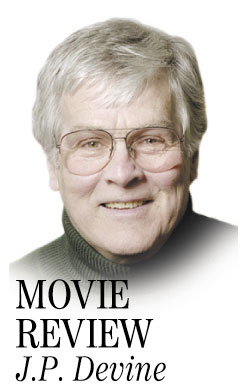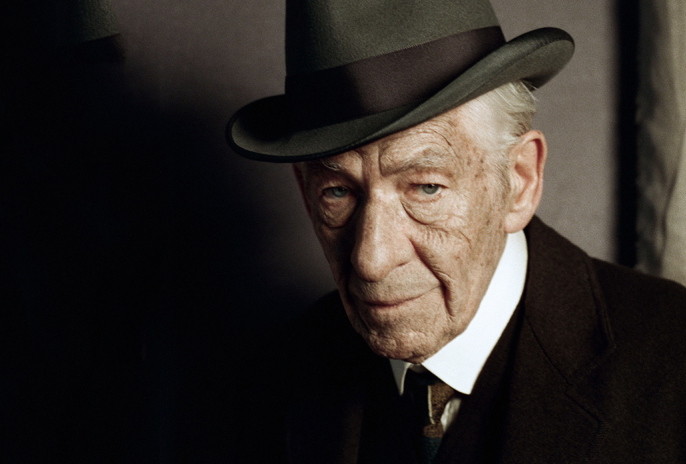“Where there is no imagination there is no horror.” — Arthur Conan Doyle in “A Study in Scarlett”
Wouldn’t you know? More actors have played Sherlock Holmes than have played Jesus. It’s true, more than 75 actors have played him in 211 movies.
They were all fun, funny, mysterious, dark, complex, but they were all the creation of Holmes’ roommate, John Watson, who in turn was the creation of Sir Arthur Conan Doyle.
But now we get something different, something wonderful, something we long expected, but I suspect we never dreamed it would be this good.
We get the great Ian McKellen, Britain’s, probably the world’s, finest complete stage and screen actor, in what may be the most intelligent Sherlock ever, the creation of writer Jeffrey Hatcher, based on his novel A Slight Trick of the Mind,” and directed by Bill Condon (“Gods and Monsters,” “Chicago.”)
It’s 1947 as the 93-year-old Sherlock is returning to England from Japan, where he sought a rare plant, “prickly ash,” with healing powers, that Sherlock insists are for arthritis, but he and his doctor discuss the specter of growing memory loss. They both know what’s to come.
In Japan, on the very ruins of Hiroshima, Sherlock is aided by the son of a Japanese diplomat Sherlock had met during the war. This mystery is one of three that make their way through the film. Know going in, that these are no old-time thriller cases, but mysteries of heart and soul, no less stirring or compelling. One will end in sudden death, a death that will change Holmes’ life forever.
Old Sherlock, home now on his beloved English coast in a tiny, well-appointed cottage, is growing feebler, and served by a widowed housekeeper, who wants to leave (the always welcome Laura Linney.) With her is her precocious, sensitive son Roger (a captivating Milo Parker) who mourns the wartime death of his father.
Our Sherlock is fully retired now and aches to fade away from the life of fame, and to live a life of solitude and bee tending on his farm by the sea. The boy, having read the early books, is well aware of Watson’s famous creation, but like many others, is surprised there never was the iconic, mythical Deer Stalker hat, pipe and violin. “Watson made all of that up,” Sherlock tells him, “in his penny dreadfuls with an elevated prose style.”
Young Roger asks questions, and Sherlock answers the best he can. There is the true story, found in Sherlock’s papers, of a visit of a man concerned about his wife. There is a velvet glove and a dead bee, a photograph and a scent. Mystery number two.
The third involves a near death by bees that is beautifully played out, and a strange musical instrument, the glass armonica, that may or may not possess occult powers.
Don’t expect a good deal from that.
“Mr. Holmes” unfolds as we might expect from an artist like cinematographer Tobias Schliessler, as a canvass of spectacular beauty, color and texture, of the English coast, the streets of London, war ravaged Japan and, completely unexpected, two visions of Hiroshima that are startling.
Director Bill Condon, who worked with McKellen on “Gods and Other Monsters,” handles it beautifully.
But the star, of course, is the extraordinary Ian McKellen. In the present day scenes at his cottage, McKellen creates a shuffling, almost feeble old man, losing his memory, his ocean blue eyes full of remembered tears.
In flashbacks set 35 years earlier on Baker Street, he is an aging boulevardier, but swifter of foot, keener of wit. McKellen shuttles back and forth between the two like the master he is. It’s a performance to buy him, should he want one, an Oscar.
“Mr. Holmes,” will certainly be on that list.
J.P. Devine s a former stage and screen actor.
Send questions/comments to the editors.




Success. Please wait for the page to reload. If the page does not reload within 5 seconds, please refresh the page.
Enter your email and password to access comments.
Hi, to comment on stories you must . This profile is in addition to your subscription and website login.
Already have a commenting profile? .
Invalid username/password.
Please check your email to confirm and complete your registration.
Only subscribers are eligible to post comments. Please subscribe or login first for digital access. Here’s why.
Use the form below to reset your password. When you've submitted your account email, we will send an email with a reset code.